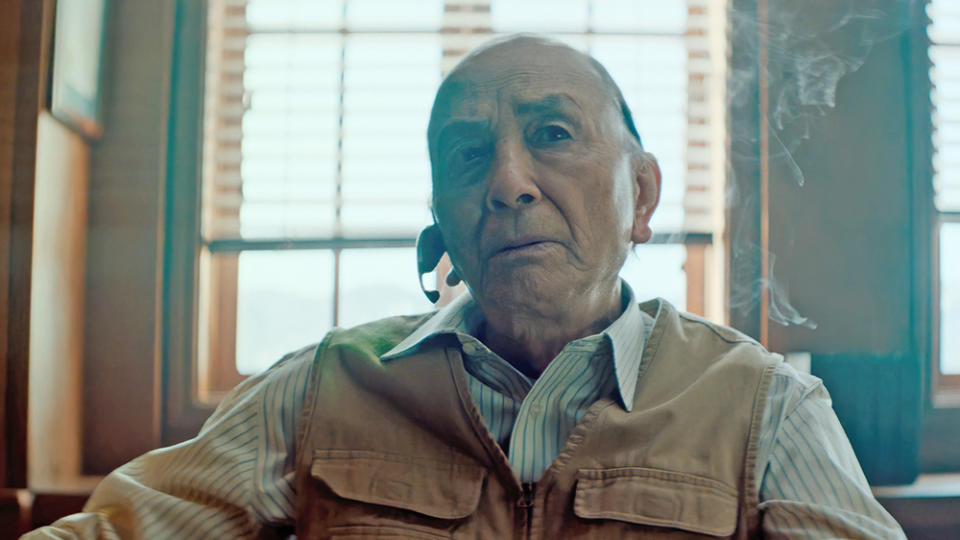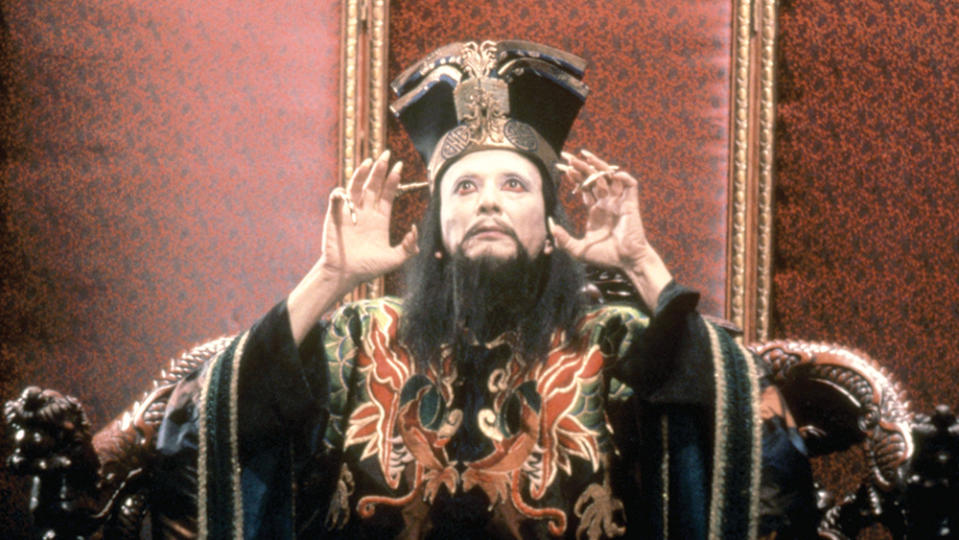Why It Took Six Decades for James Hong to Get a Star on the Walk of Fame
- Oops!Something went wrong.Please try again later.
- Oops!Something went wrong.Please try again later.

When the petition to get James Hong a star on the Hollywood Walk of Fame began, the response was immediate and overwhelming. Recognizing the groundbreaking body of work from the 93-year-old actor, who has more than 650 credits to his name, actor-producer Daniel Dae Kim started a crowdfunding campaign in 2020 to raise the $55,000 necessary for the star. The goal was met within four days.
The only person who didn’t respond right away was Hong himself. “In actuality, I didn’t hear a thing,” Hong says with a laugh. “Somehow the internet wasn’t quite working or I didn’t get the email. The next thing I hear, they had the money already.”
More from Variety
'Doctor Strange 2' Played More Than 60 Times in a Single NYC Theater on Thursday. Is That a Problem?
'Gimme My Money' Female-Led Kung-Fu Comedy Getting Cannes Market Launch by OMG (EXCLUSIVE)
'Everything Everywhere All at Once' Star Stephanie Hsu Signs With CAA (EXCLUSIVE)
Hong, who will receive his star in a ceremony on May 10, is still somewhat overwhelmed by the honor. “I want to thank all the fans and friends who donated their money. It boggles my mind to think that there’s enough people out there who would do that,” he says. “And I don’t know who they are, so I’ll just have to thank them through your article.”
It’s hard to imagine anyone who has consumed entertainment in the past seven decades who isn’t a fan of the actor. People still call out “Seinfeld, four!” when they see him, referencing an infamous “Seinfeld” episode in which Hong plays the maître d’hôtel of a Chinese restaurant who continues to tell the gang their table will be ready in five or 10 minutes. Hong says most people approach him and reference his role as the evil David Lo Pan in the 1986 cult hit “Big Trouble in Little China” or as Chew, the synthetic eyeball specialist in 1982’s “Blade Runner.”
With that instantly recognizable face and voice, Hong’s career can be traced back all the way to 1950s TV series including “The New Adventures of Charlie Chan” and “Dragnet” to such films as his current hit, “Everything Everywhere All at Once.” That film’s directors, Daniel Kwan and Daniel Scheinert — known collectively as the Daniels — say that working with Hong was everything they could have imagined.
“There are a million things you could say about James Hong and the experience of working with him,” they told Variety via email. “But the most striking thing to us was how, after almost a century of being in this industry, he still hustles harder than anyone we know, how much he still cares about the work he is doing, and above all, how hard this man still loves to party.”

Allyson Riggs/A24
Kim met Hong for the first time when they worked together on the TV show “Charmed” in 2001. “Of course, even then I knew who he was and all that he had accomplished,” says Kim. “Then, around five or six years ago, I was meeting some friends and we started naming all the amazing projects that he’d been a part of. We realized the number was literally in the thousands. It caused me to ask why more people didn’t know him by name, or recognized his incredible career. That’s when I decided that I would do what I could to get him a star on the Hollywood Walk of Fame.”
It’s been a long journey for Hong, who was born the son of Chinese immigrants in Minneapolis, before his father moved the family back to Hong Kong when Hong was 5. When the family returned to America a few years later, the shy, quiet Hong had to learn English all over again. Though he began performing on stage in junior high and high school, he opted to pursue a degree in civil engineering, first at University of Minnesota.
The Korean War interrupted his studies and when Hong was sent to Camp Rucker in Alabama with the U.S. Army, he found his skills being used to put together performances for Special Services. Rather than be sent overseas, he jumped at the opportunity to stay and continue to organize live shows.
After the war, he picked back up with his civil engineering studies at the University of Southern California in Los Angeles. But he found it hard to go back to his studies, and now he was in the center of the filmmaking capital of the world. An appearance on Groucho Marx’s game show “You Bet Your Life” in which he did an imitation of the host garnered a huge response — Hong received tons of fan mail and nightclub offers, and it helped him land his first agent.
Despite his impressive filmography, Hong says it wasn’t easy. “In the early days, there were no opportunities whatsoever,” he recalls. “Opportunities were very few and Asians were still looked down upon as this silent minority. In a sense I feel I was born too early, because there were no chances.”
So the actor took it upon himself to create more opportunities and learning experiences. He started the first class for Asian Americans at the Desilu Playhouse where they trained under director Joseph Sargent (“The Taking of Pelham One Two Three.”) In 1965, he and other artists, including Mako, co-founded the East/West Players, the prestigious Los Angeles-based theater company for Asian American artists that continues to thrive today.
“We started with a small group and now look, thousands and thousands of people pour through that door,” Hong says. “And they get trained by the best teachers in the organization.”
Hong was also a vital voice in protesting poor representations of Asians on screen, such as the 1962 film “Confessions of an Opium Eater.” Hong says it was the first protest in Hollywood by an Asian American group.
Asked if he ever worried about repercussions for his actions, he states: “No, not really. That really never entered my mind. I just go ahead and do what I had to do.”
Even today, Hong says there is a still a ways to go. “I would definitely like to see what I work for become a reality,” he says. “I’d love for movies and series to have better representation, to see us playing roles like doctors and businessmen and politicians, like the reality of society.” He feels encouraged that things are improving, and cites fellow actors including Kim for taking up the effort.
“I’ve worked for all that for 70 years and it’s just beginning as far as I’m concerned. Maybe another 10 years when I’m looking down at this world and I say, ‘Yeah, progress.’”
And Hong is still adding to that busy filmography. “Even if I wanted to retire, I don’t think they would let me,” he says with a laugh. He’ll soon be heard in the animated series “Kung Fu Panda: The Dragon Knight” and “Gremlins: Secrets of the Mogwai” and will reunite with his “Everything Everywhere” co-star Michelle Yeoh in the Apple TV Plus series “American Born Chinese.”
And he’s earning raves for “Everything Everywhere,” which is proving to be a big hit for indie studio A24. Playing Yeoh’s elderly father, Gong Gong, Hong was the only actor the Daniels saw for the role.
“The only reservation we had was we didn’t know if he would be available or comfortable doing a role that demanded so much because he was already over 90 years old at the time we reached out to him,” the Daniels told Variety. “He came in and asked, ‘How senile do you want me to act for this role?’ We were curious to see how far he could take it, so we told him to go as senile as he wanted. He immediately turned on a switch and became so convincingly ‘old’— wandering around as if lost, losing his train of thought, and even singing to himself — that we were genuinely afraid it was no longer an act and he was going to fall over and hurt himself. The moment we said cut, he was back to his witty, sharp self again. The amount of control he has as a performer was astounding. We immediately knew we had found Gong Gong.”

©20thCentFox/Courtesy Everett Collection
Hong is also looking forward to the ceremony on May 10, where guest speakers include Jamie Lee Curtis and Kim.
“It’s so satisfying, for a number of reasons,” Kim says of the honor. “First and foremost, he’s earned it. It also gives me hope that other Asian American actors whose work has been overlooked will get their chance to be recognized, both by the public and during awards season. I also think it’s so important that those of us lucky enough to work in the industry today acknowledge the achievements of those who came before us. It’s one way we can show our gratitude for all the ways they blazed the trail so that we could walk an easier path today.”
Hong says his entire family, whom he estimates to be about 70 people, will be attending. “It’s going to be quite the party,” he says, with a traditional Chinese lion dance performance. “Maybe I’ll get out there, if I can, and dance with a lion.”
TIPSHEET
WHAT: James Hong receives a star on the Walk of Fame
WHEN: 11:30 a.m., May 10
WHERE: 6931 Hollywood Blvd.
WEB: walkoffame.com
Best of Variety
Sign up for Variety’s Newsletter. For the latest news, follow us on Facebook, Twitter, and Instagram.

